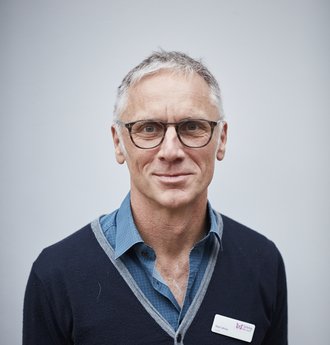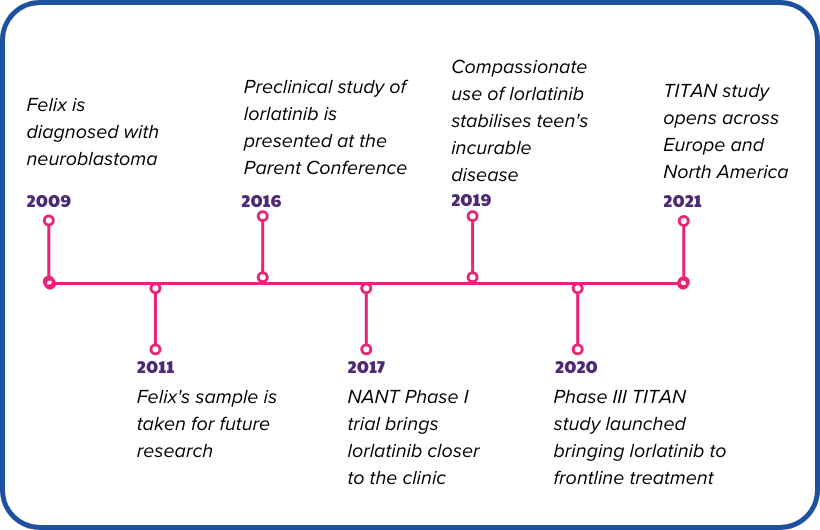Behind the research: Felix's incredible legacy
Felix White was a happy, four-year-old like any other. He loved Star Wars, walks on secret paths and generally messing about with his identical twin brother Elliot and older sister Grace. When he was four years old he started to complain about some back pain and his parents, Colleen and Matt, took him to the hospital where their worlds were turned upside down. He was diagnosed with Stage 4 high-risk neuroblastoma in 2009. Treatment to fight the devastating disease was started immediately, and Felix underwent a total of 19 rounds of chemotherapy, surgery, bone marrow transplant and radiotherapy.
The family travelled to Germany to receive immunotherapy treatment which was not available to Felix here in the UK. Devastatingly he relapsed at the end of the treatment and the family went to America to try to save his life. His disease spread quickly and he needed specialist surgery on a tumour in his brain and in his lungs. Despite these numerous attempts to rid Felix of the neuroblastoma the disease kept progressing. Felix remained immensely brave throughout the entirety of his battle, but unfortunately passed away in August 2011 after two and a half years of intense therapy.
Felix’s disease was highly resistant to treatment because of a particular genetic factor known as an ALK mutation. At the time Felix was fighting his cancer, there was no established drug able to successfully supress this. Moments after his passing, and after seeking permission from Colleen and Matt, doctors took a sample of Felix’s blood, which has since been used to grow these highly resistant cancer cells to use in drug development- in particular for developing ALK inhibitors which may helped tackle his disease.
“Throughout Felix’s journey we were surrounded by incredible, inspirational people who dedicate their lives to tackling this disease. Releasing Felix’s blood cells to support Yael and John’s work, despite being at the hardest time of our lives, felt like a natural thing to do. Any good that could come of it, large or small, was always going to be worth it.”
Colleen and Matt, Felix's parents
Previously these kinds of therapies had only been progressed for adult cancers, and often showed little or no effect in neuroblastoma due to its unique nature. Thanks to the dedication of Felix’s family in agreeing to use his cells in this way, a number of ALK inhibitors are now being developed and showing promising results in neuroblastoma patients. One of these is lorlatinib, which was tested against the bank of cells named ‘Felix’. This particular drug is progressing through clinical trials and has transformed the lives of some children already. It is also being introduced into frontline therapy for patients with ALK positive high-risk neuroblastoma in the first ever joint trial by the Children’s Oncology Group (COG) in North America and European Society for Paediatric Oncology (SIOPE). This $1.3 million trial- the TITAN study, was funded by Solving Kids’ Cancer UK with six other parent-led charities after a plea for more transatlantic collaboration in finding treatments for newly diagnosed patients.
Leading the study in the US at the Children’s Hospital of Philadelphia is Dr Yael Mossé, the very doctor who drew Felix’s blood after he sadly lost his battle. On the impact this has and will have on neuroblastoma research, she said “It is far-reaching and truthfully immeasurable. I can tell you that Felix is always with me, in everything I do — in the lab and in the clinic... Thanks to Felix, some very special children are living longer and with exceptional quality of life.”
We are now extremely lucky to have Felix’s dad, Matt, as a Trustee at Solving Kids’ Cancer UK. Felix’s incredible legacy is an inspiration to us all at Solving Kids’ Cancer UK, and we will continue in our fight for a better future for children just like him.
“This charity means a great deal to me and always will. It was always there just when we needed it, giving our family support, educating us on potential paths to take and paving the way for potentially life-saving treatment for Felix. We want to help ensure that other families who face this terrible disease can have the same access to the brilliant support from Solving Kids' Cancer that we did.”
Matt, Dad to Felix, Trustee at Solving Kids' Cancer UK





